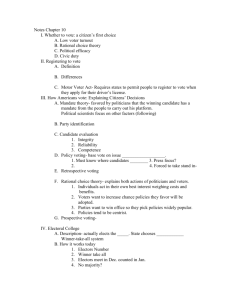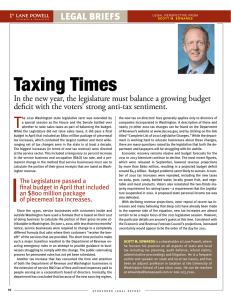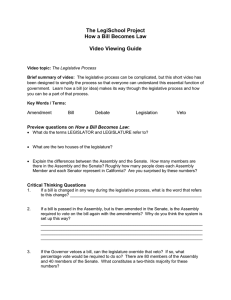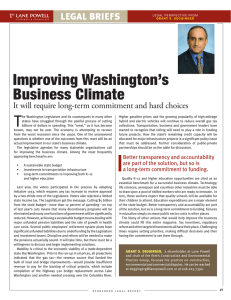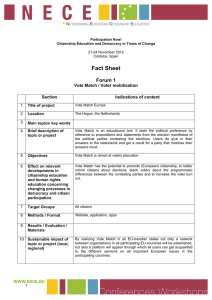States with Legislative Supermajority Requirements to Increase Taxes, 2010
advertisement
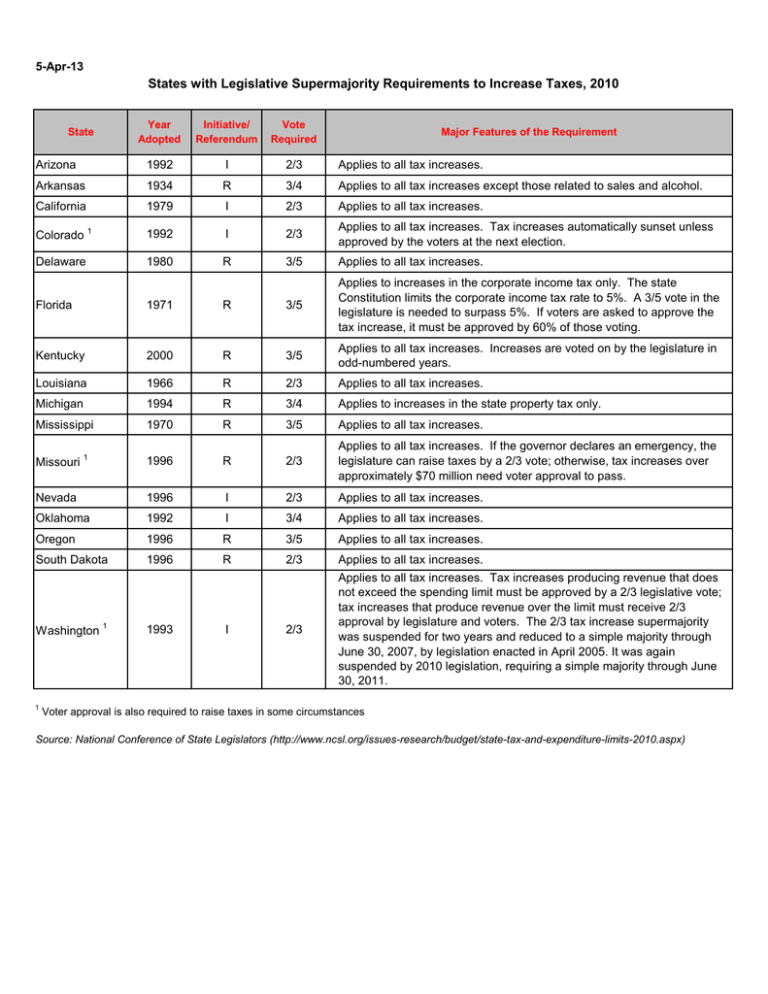
5-Apr-13 States with Legislative Supermajority Requirements to Increase Taxes, 2010 Year Adopted Initiative/ Referendum Vote Required Arizona 1992 I 2/3 Applies to all tax increases. Arkansas 1934 R 3/4 Applies to all tax increases except those related to sales and alcohol. California 1979 I 2/3 Applies to all tax increases. Colorado 1 1992 I 2/3 Applies to all tax increases. Tax increases automatically sunset unless approved by the voters at the next election. Delaware 1980 R 3/5 Applies to all tax increases. State Major Features of the Requirement Florida 1971 R 3/5 Applies to increases in the corporate income tax only. The state Constitution limits the corporate income tax rate to 5%. A 3/5 vote in the legislature is needed to surpass 5%. If voters are asked to approve the tax increase, it must be approved by 60% of those voting. Kentucky 2000 R 3/5 Applies to all tax increases. Increases are voted on by the legislature in odd-numbered years. Louisiana 1966 R 2/3 Applies to all tax increases. Michigan 1994 R 3/4 Applies to increases in the state property tax only. Mississippi 1970 R 3/5 Applies to all tax increases. Missouri 1 1996 R 2/3 Applies to all tax increases. If the governor declares an emergency, the legislature can raise taxes by a 2/3 vote; otherwise, tax increases over approximately $70 million need voter approval to pass. Nevada 1996 I 2/3 Applies to all tax increases. Oklahoma 1992 I 3/4 Applies to all tax increases. Oregon 1996 R 3/5 Applies to all tax increases. South Dakota 1996 R 2/3 Applies to all tax increases. 2/3 Applies to all tax increases. Tax increases producing revenue that does not exceed the spending limit must be approved by a 2/3 legislative vote; tax increases that produce revenue over the limit must receive 2/3 approval by legislature and voters. The 2/3 tax increase supermajority was suspended for two years and reduced to a simple majority through June 30, 2007, by legislation enacted in April 2005. It was again suspended by 2010 legislation, requiring a simple majority through June 30, 2011. Washington 1 1 1993 I Voter approval is also required to raise taxes in some circumstances Source: National Conference of State Legislators (http://www.ncsl.org/issues-research/budget/state-tax-and-expenditure-limits-2010.aspx) States with Legislative Supermajority Requirements to Increase Taxes, 2006 Year Adopted Initiative/ Referendum Vote Required Arizona 1992 I 2/3 Applies to all tax increases. Arkansas 1934 R 3/4 Applies to all tax increases except those related to sales and alcohol. California 1979 I 2/3 Applies to all tax increases. Colorado 1 1992 I 2/3 Applies to all tax increases. Tax increases automatically sunset unless approved by the voters at the next election. Delaware 1980 R 3/5 Applies to all tax increases. State Major Features of the Requirement Florida 1971 R 3/5 Applies to increases in the corporate income tax only. The state Constitution limits the corporate income tax rate to 5%. A 3/5 vote in the legislature is needed to surpass 5%. If voters are asked to approve the tax increase, it must be approved by 60% of those voting. Kentucky 2000 R 3/5 Applies to all tax increases. Increases are voted on by the legislature in odd-numbered years. Louisiana 1966 R 2/3 Applies to all tax increases. Michigan 1994 R 3/4 Applies to increases in the state property tax only. Mississippi 1970 R 3/5 Applies to all tax increases. 1996 R 2/3 Applies to all tax increases. If the governor declares an emergency, the legislature can raise taxes by a 2/3 vote; otherwise, tax increases over approximately $70 million need voter approval to pass. Nevada 1996 I 2/3 Applies to all tax increases. Oklahoma 1992 I 3/4 Applies to all tax increases. Oregon 1996 R 3/5 Applies to all tax increases. South Dakota 1996 R 2/3 Applies to all tax increases. 2/3 Applies to all tax increases. Tax increases producing revenue that does not exceed the spending limit must be approved by a 2/3 legislative vote; tax increases that produce revenue over the limit must receive 2/3 approval by legislature and voters. Missouri 1 Washington 1,2 1993 I 1 Voter approval is also required to raise taxes in some circumstances 2 The 2/3 supermajority was suspended for two years and reduced to a simple majority through June 30, 2007, by legislation enacted in April 2005 Source: National Conference of State Legislators (http://www.ncsl.org/programs/fiscal/tels2005.htm) States with Legislative Supermajority Requirements to Increase Taxes, 2005 Year Adopted Initiative/ Referendum Vote Required Arizona 1992 I 2/3 Applies to all tax increases. Arkansas 1934 R 3/4 Applies to all tax increases except those related to sales and alcohol. California 1979 I 2/3 Applies to all tax increases. Colorado 1 1992 I 2/3 Applies to all tax increases. Tax increases automatically sunset unless approved by the voters at the next election. Delaware 1980 R 3/5 Applies to all tax increases. State Major Features of the Requirement Florida 1971 R 3/5 Applies to increases in the corporate income tax only. The state Constitution limits the corporate income tax rate to 5%. A 3/5 vote in the legislature is needed to surpass 5%. If voters are asked to approve the tax increase, it must be approved by 60% of those voting. Kentucky 2000 R 3/5 Applies to all tax increases. Increases are voted on by the legislature in odd-numbered years. Louisiana 1966 R 2/3 Applies to all tax increases. Michigan 1994 R 3/4 Applies to increases in the state property tax only. Mississippi 1970 R 3/5 Applies to all tax increases. 1996 R 2/3 Applies to all tax increases. If the governor declares an emergency, the legislature can raise taxes by a 2/3 vote; otherwise, tax increases over approximately $70 million need voter approval to pass. Nevada 1996 I 2/3 Applies to all tax increases. Oklahoma 1992 I 3/4 Applies to all tax increases. Oregon 1996 R 3/5 Applies to all tax increases. South Dakota 1996 R 2/3 Applies to all tax increases. 2/3 Applies to all tax increases. Tax increases producing revenue that does not exceed the spending limit must be approved by a 2/3 legislative vote; tax increases that produce revenue over the limit must receive 2/3 approval by legislature and voters. Missouri 1 Washington 1,2 1993 I 1 Voter approval is also required to raise taxes in some circumstances 2 The 2/3 supermajority was suspended for two years and reduced to a simple majority through June 30, 2007, by legislation enacted in April 2005 Source: National Conference of State Legislators (http://www.ncsl.org/programs/fiscal/tels2005.htm)

